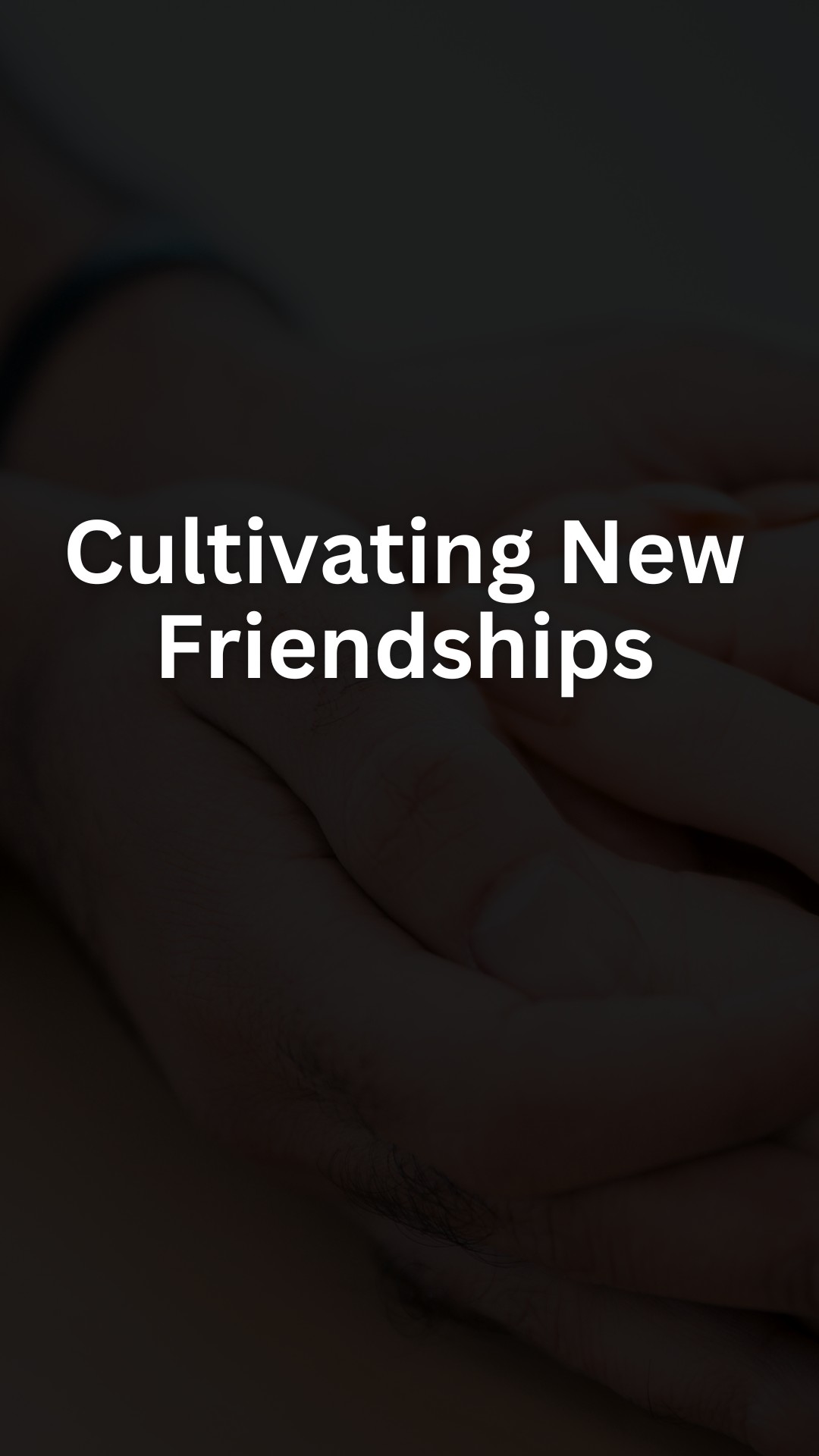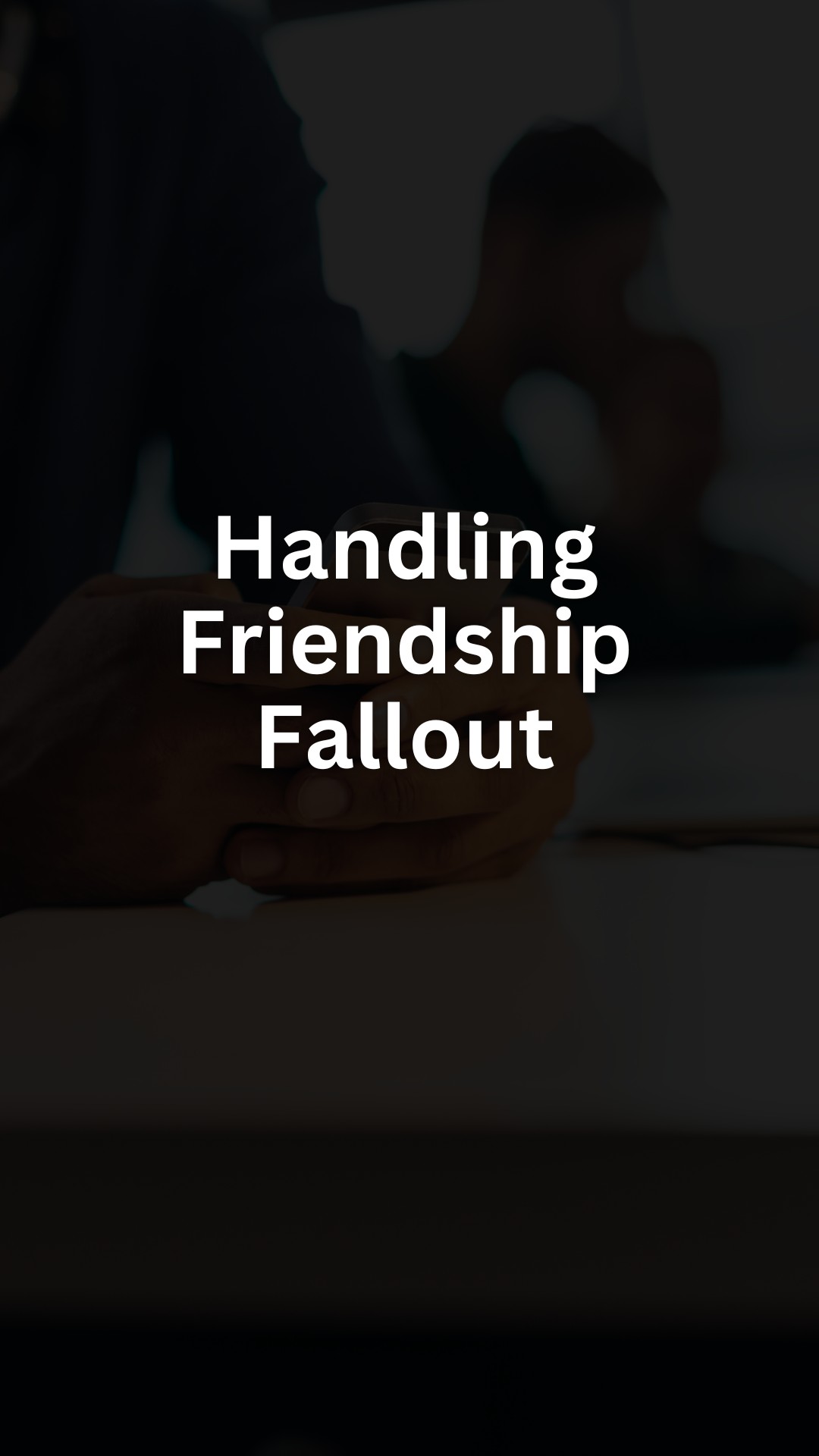Going through a divorce can be one of the toughest experiences in life. It’s natural to feel overwhelmed, but it’s important to remember your friends are there to support you.
Maintaining your friendships during this time is crucial to your emotional well-being.
Friends can provide a sense of normalcy and a listening ear when you need it most.
Keep the lines of communication open. Let your friends know how much their support means to you and try to be there for them too.
Balancing give-and-take in your friendships can make a big difference.
Your friendships can be a source of strength. Make an effort to stay connected by planning regular catch-ups, even if it’s just a quick call.
Showing that you value their friendship can help you navigate this challenging period together.
Understanding the Impact of Divorce on Friendships

Divorce can shake up your friendships. It may cause your social circle to change in unexpected ways.
Friends might feel awkward or unsure about how to support you.
Your friends could take sides. This can lead to strained relationships. They might feel they need to choose between you and your ex.
Some friends might pull away. They might not know what to say or fear getting involved. Others might be great listeners and offer you a lot of support.
Feelings of isolation: You might feel lonely if friends distance themselves. This can add to the stress of the divorce.
Jealousy and Resentment: Some married friends might worry about their own marriages. They may even feel jealous if you start dating someone new.
Communicating Clearly: Talking openly with friends about your feelings and needs can help them understand how to support you.
Be Prepared for Changes: Friendships evolve during tough times. It’s normal for some to become stronger and others to drift apart.
Supportive Friends:
- Listen without judging
- Offer practical help
- Spend time with you
Classifying Friendships:
| Supportive Friends | Distant Friends |
|---|---|
| Listen to you | Avoid talking |
| Stay in touch | Let relationships fade |
| Offer help | Act uncomfortable |
Communicating with Friends about Your Divorce

Sharing news about your divorce with friends can be challenging. It’s important to choose the right time, set boundaries, and respect privacy to maintain your friendships.
Choosing the Right Time to Share
When you decide to tell your friends about your divorce, timing is key.
Pick a moment when you can talk without interruptions. Make sure you and your friend have enough time to discuss things.
Avoid bringing it up during social events or busy times.
Share your news in a calm and honest way. Be clear about your feelings but avoid blaming your ex-partner. This helps your friends understand without feeling like they need to take sides.
Setting Boundaries for Discussions
Talking about your divorce can be helpful, but you need to set limits.
Let your friends know what you feel comfortable discussing. It’s okay to say certain topics are off-limits. This keeps conversations respectful and focused.
If friends ask too many questions or give unwanted advice, gently remind them of your boundaries.
You can say something like, “I appreciate your concern, but I prefer not to talk about that right now.” This helps maintain healthy and supportive conversations.
Respecting Privacy
Respecting both your own privacy and your ex-partner’s is vital.
Share only what you feel is necessary. Be mindful of details that might be too personal or hurtful.
Avoid sharing private information that your ex-partner wouldn’t want made public.
Also, encourage your friends to keep your discussions confidential.
They should understand that the information you share should not be spread around. This trust will help you feel more secure in your friendships while navigating your divorce.
Prioritizing Your Emotional Health

During a divorce, it’s crucial to focus on your emotional health. Taking steps like seeking support from friends, addressing loneliness, and practicing self-care can make a big difference.
Seeking Support from Friends
Friends can offer emotional support during a divorce. Talk to them about your feelings.
Being open about your struggles helps build a network of support. Don’t hesitate to lean on your friends—they want to help.
Involving trusted friends in your life helps you feel less alone. Join them for activities you enjoy.
It’s important to keep up with social events. Staying connected provides stability and comfort.
Navigating Loneliness
Divorce can bring feelings of loneliness. To cope, stay busy with hobbies or activities you love.
Pick up new interests or revisit old ones. Engaging in activities distracts and uplifts you.
Meeting new people can also help. Consider joining clubs or groups related to your interests.
Building new connections reduces loneliness. Volunteering is another way to meet people while helping others.
Self-Care Practices
Self-care is vital during a divorce. Make time for activities that relax and rejuvenate you.
Exercise regularly, as it boosts mood and energy. Even simple walks can be beneficial.
Prioritize sleep and proper nutrition. A well-balanced diet and good sleep habits greatly impact your mood and physical health.
Consider mindfulness practices like meditation or yoga, which help manage stress and improve focus.
Take small breaks to unwind. This might include reading, listening to music, or taking a hot bath.
Self-care helps rebuild your strength and resilience.
Maintaining Mutual Friendships

When going through a divorce, it’s important to consider how mutual friendships might be affected. This guide helps you navigate loyalties, plan group events, and handle potential conflicts to keep these friendships strong.
Navigating Loyalties
During a divorce, shared friends might feel torn between you and your ex-partner.
Be clear about your needs but avoid forcing them to pick sides. Encourage friends to support both of you.
Respect their decisions and don’t vent about your ex to mutual friends. This helps prevent putting them in uncomfortable positions.
Stay neutral when discussing your ex with these friends. Keeping boundaries can prevent unnecessary drama.
Remember to practice empathy; your friends may struggle with maintaining their relationships with both parties.
Organizing Inclusive Events
Planning events that include mutual friends can help keep bonds intact.
Choose neutral venues where everyone feels comfortable. Activities like group dinners, hikes, or movie nights can be good options.
Ensure that invitations are inclusive but understand if some friends may not feel comfortable attending.
Talk to your ex about which events they plan to attend. Coordination can prevent awkward encounters. Creating a shared calendar might help manage this.
Always consider the feelings of your mutual friends when planning these activities.
Avoiding Triangle Friendships
Triangle friendships can happen when mutual friends become go-betweens for you and your ex.
Avoid this by setting clear boundaries. Don’t ask friends to relay messages or gather information about your ex.
This keeps friendships from becoming strained and maintains privacy.
Encourage direct communication with your ex whenever possible.
Avoid discussing your ex excessively with mutual friends, as it places them in a difficult spot.
Prioritizing their comfort can help preserve these important relationships.
Maintaining Independence in Friendships

When going through a divorce, it’s important to keep your friendships healthy while also maintaining your own independence.
Being independent helps you stay strong and confident during tough times. Here are some tips to help you maintain that balance:
- Communicate Clearly: Let your friends know your needs and boundaries. Share how much time you can spend together and be honest about your feelings.
- Respect Boundaries: Understand that your friends may also have their own lives and commitments. Don’t expect them to always be available.
- Focus on Self-Care: Make time for yourself. Engage in activities you enjoy, and take moments to relax and recharge.
Examples of self-care activities:
| Activity | Benefit |
|---|---|
| Reading | Reduces stress |
| Exercise | Boosts mood and energy |
| Meditation | Promotes mental clarity |
| Hobbies | Keeps you engaged and happy |
- Be Independent: Spend time alone to reflect and grow. This will help you understand your own needs better.
- Avoid Dependence: Don’t rely too heavily on any single friend for support. Spread out your support network.
Ways to avoid dependence:
- Make new friends.
- Join support groups.
- Reach out to family members.
Cultivating New Friendships

Making new friends during this time can help you feel supported. Attend social events like local meet-ups or community classes.
Ways to Meet New People:
- Join a Club: Book clubs, fitness groups, or hobby classes.
- Volunteer: Help out at local charities or community events.
- Online Groups: Engage in forums or social media groups.
Starting Conversations:
- Ask questions about their interests.
- Share a bit about yourself.
- Listen actively.
Building these new connections can bring a positive change in your life. Keep an open mind and be patient. New friendships may take time to develop, but they can contribute to your emotional well-being.
Handling Friendship Fallout

Divorces can lead to shifts in your social circle. Your friends might take sides or show a lack of support. Here’s how to navigate these challenges.
Dealing with Friends Taking Sides
It’s common for friends to feel stuck in the middle. Some may choose sides, which can hurt.
Stay calm and avoid forcing them to pick.
Talk openly with your friends. Let them know you value their friendship and don’t want them to feel pressured.
Friends need to understand that both you and your ex need support during this tough time.
Moving on from Unsupportive Friends
Some friends may not be there for you. Recognize when a friendship is causing you pain and stress.
It’s okay to let go of relationships that are no longer beneficial.
Focus on building a supportive circle. Surround yourself with those who uplift and care for you.
New friendships can offer fresh perspectives and much-needed support.
Involving Children in Friendship Dynamics

When you go through a divorce, your children’s friendships can be affected. Keeping their relationships stable and introducing new people thoughtfully are key steps.
Protecting Children’s Relationships
Focus on Stability: Children find comfort in familiar faces.
Try to maintain their playdates and regular interactions with friends. This helps keep their routine steady, which is very important during a time of change.
Communicate: Talk with your children’s friends’ parents.
Let them know about the situation and ask for their support in keeping your child’s social life consistent.
This can help create a network of understanding and patience.
Encourage Open Feelings: Let your children talk about what they feel regarding their friendships.
Listen to their concerns and reassure them that it’s okay to feel sad or confused. Your support will help them navigate these emotions.
Balancing New Introductions
Introduce Gradually: When bringing new friends or partners into your children’s lives, go slow. Let children get used to seeing new faces in a controlled environment.
Don’t rush into making them comfortable with new people.
Prioritize Comfort: Make sure your children know they can express their feelings about new introductions. Their comfort and sense of security should come first. Consult with them before making plans involving new individuals.
Create Positive Experiences: Plan fun activities that allow your children to interact with new people in enjoyable settings. This can help ease the transition and build positive associations with new friendships.
Respect Boundaries: Understand that children may need time to adjust. Respect their pace and don’t push them into forming relationships too quickly. Allow them to warm up in their own time.
Leveraging Technology to Stay Connected

During a divorce, technology can help you maintain bonds with friends, even when life feels chaotic. You can use social media and virtual tools to stay connected and nurture your friendships.
Using Social Media Wisely
Social media platforms like Facebook, Instagram, and Twitter are great for keeping in touch. Share important updates or daily moments to keep your friends in the loop.
Be mindful of what you share, aiming to keep posts positive or neutral. Avoid posting negative or hurtful things about your divorce.
Creating private groups or chats can help. These spaces let you discuss personal matters with close friends without broadcasting to everyone.
Using features like Stories or WhatsApp Status can also provide close friends with quick updates.
Virtual Get-Togethers
Virtual get-togethers are another effective way to stay connected. Use video call apps like Zoom, Skype, or Google Meet to host regular catch-ups with friends.
Schedule these calls to ensure you all have time to join.
You can also get creative with your virtual hangouts. Host a movie night using streaming services with watch party features or organize a virtual game night.
Online platforms offer various ways to interact and spend quality time together, despite physical distance.
Make these virtual meetings a regular habit, just like you would with in-person meetings. This consistency helps maintain and strengthen your friendships during challenging times.
Celebrating Milestones and Creating New Traditions

During a divorce, celebrating milestones can help keep friendships strong. Birthdays, holidays, and other special events are moments to share joy with friends.
One way to stay connected is by creating new traditions. This can mean starting a new yearly picnic, a game night, or a holiday brunch with friends.
- Birthdays: Gather friends for a dinner or a small party.
- Holidays: Plan special activities like baking cookies or watching a favorite movie together.
- Achievements: Celebrate promotions, new jobs, or personal goals with your friends.
Tips:
| Event | New Tradition Idea |
|---|---|
| Birthday | Host a themed party or virtual gathering |
| New Year’s | Create a time capsule together |
| Halloween | Organize a costume contest or pumpkin carving night |
| Summer | Plan a beach day or a barbecue |
Starting these new traditions can give everyone something to look forward to. They help create happy memories despite the changes.
Participation is key. Invite your friends to help plan or suggest ideas. This makes everyone feel involved and connected.
Remember, it’s okay if some old traditions don’t fit anymore. Creating new ones is a fresh start, and it can strengthen your friendships during this challenging time.
Seeking Professional Help when Needed

Divorce can be tough on friendships. During this time, emotions can run high. It might help to talk to a professional like a therapist. This can give you a safe space to express your feelings.
A therapist can also teach you ways to manage stress and anger. These skills can protect your friendships from negative impacts. You can learn how to communicate better and prevent misunderstandings.
If you notice friends pulling away, consider a couples or family counselor. They can help clear up confusion and improve relationships.
When to Seek Professional Help:
- Feeling overwhelmed and unable to cope
- Constant arguments with friends or family
- Trouble focusing on daily tasks
Benefits of Professional Help:
- Improved Communication: Learn to talk about your feelings without causing more problems.
- Stress Relief: Techniques to manage stress and avoid taking it out on others.
- Emotional Support: A neutral person to listen and offer guidance.
Sometimes, joining a support group can be helpful. These groups allow you to meet others going through similar experiences. Sharing stories may provide comfort and reduce feelings of isolation.
If you can’t afford private therapy, consider community resources. Many communities offer free or low-cost counseling services.
Seeking help is a sign of strength, not weakness. It shows you care about maintaining your friendships during this challenging time.
Frequently Asked Questions

This section addresses common concerns about supporting friends during a divorce, maintaining friendships with both parties, managing isolation, and more.
What are the best ways to offer support to a friend going through a divorce?
Listen without judging. Sometimes, they need a shoulder to cry on. Offer practical help like babysitting or running errands. Show empathy and be patient.
Can you maintain a friendship with both parties after their divorce, and how?
It is possible. Be neutral and avoid taking sides. Spend time with both parties separately to maintain the friendships. Respect each person’s privacy and emotions during this time.
How can one manage feelings of isolation from unsupportive friends during a divorce?
Seek out supportive friends and family members. Join support groups or online communities. Focus on self-care and new hobbies to keep yourself engaged and connected.
What kind of care package items are appropriate for a friend dealing with the challenges of divorce?
Include items like comforting snacks, self-care products, inspirational books, and handwritten notes. Think of things that can provide comfort and show that you care.
What is the most effective advice to give someone navigating the complexities of divorce?
Encourage them to seek legal advice and counseling. Remind them to take care of their emotional and physical health. Suggest focusing on the future and setting new goals.
How can someone stay neutral and still be supportive when mutual friends are divorcing?
Keep communications about each person separate. Avoid discussing one friend with the other.
Offer support without taking sides or passing judgment.